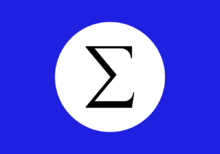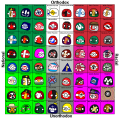Brazilian Integralism is an ![]() authoritarian, culturally
authoritarian, culturally ![]() right-wing and economically
right-wing and economically ![]() ambiguous ideology.
ambiguous ideology.
Brazilian Integralism broadly believes there should be "a fully integrated social and political order, based on converging patrimonial (inherited) political, cultural, religious, and national traditions of a particular state." While Integralism refers to a broad set of movements, which vary from nation to nation, this article is specifically about the Brazilian interpretation of it. He is not fascism in the way it's commonly understood, but is "paleo-fascist," to be more accurate. While fascism supports the creation of corporations dependent on the state, integralism wants to create organic and independent ones, not interfering in anyone's jobs or companies.
While fascists believe that the state is the end, integralists think that the state is the beginning, the human being is the means, and reaching God is the end. Most fascists advocate for the reformulation of neo-pagan religions, unlike integralists, whose ideas are inspired by Christian theology. They believe that the only God is Jesus and that the leader is not the personification of the state but only a normal person in a position of power; for this reason, they do not support cults of personality.
History
Plínio Salgado was born on 22nd January 1895, in the small town of São Bento do Sapucaí, São Paulo, Brazil. During his childhood, he had lived with his father Francisco das Chagas Salgado, a local political leader, his mother Ana Francisca Rennó Cortez, who worked as a teacher and his grandfather Manuel Esteves da Costa, who was the son of a supporter of King Miguel I during the Portuguese Civil War (1832-1834). Plínio Salgado was a very active child at school; he developed a taste for mathematics and geometry. But, in 1911, his father died, which turned Plínio Salgado into a bitter young man. Later in his life, his interests shifted towards psychology and philosophy.
In 1915, Plínio Salgado founded a weekly newspaper called Correio de São Bento. In 1918, he began his political career by participating in the founding of a municipalist party, in which town leaders from municipalities in the Paraíba Valley region advocated for more autonomy. In the same year, Plínio Salgado married Maria Amélia Pereira. On July 6th, 1919, his daughter was born; however, to his dismay, she died fifteen days later. Salgado filled himself with sorrow, so he left his philosophy studies and found comfort in Catholic theology. He began to study the works of Brazilian Catholic thinkers such as Raimundo Farias Brito and Jackson Figueiredo.
Due to the fame of his newspaper, Plínio became known by fellow journalists and got invited to work for the Correio Paulistano, which supported the São Paulo Republican Party (PRP). Plínio Salgado became a prominent participant in the Modern Art Week of 1922, in which nationalist artists united to create pure Brazilian art pieces. In 1924, he left the Correio Paulistano to employ himself in the law firm of Alfredo Egídio de Sousa Aranha, a lawyer, businessman, and banker.
In 1926, Plínio Salgado published his first book called "The Stranger." After that, he got help from his fellow journalist friend Cassiano Ricardo to create the Movimento Verde-Amarelo ("Green-Yellow Movement"), an ufanist and nativist literary movement inside the Brazilian modernist trend. In 1927, the MVA transformed into the Escola da Anta ("Tapir School"), which idolized the Tupi people as the truest carriers of the Brazilian identity. In the same year, he published another book called "Literature and Politics" which contains anti-liberal and pro-agrarian ideas. In 1928, He was elected state deputy in São Paulo by the PRP and, in 1930, he supported the presidential candidacy of Júlio Prestes against Getúlio Vargas. During this period, he traveled to Europe and became impressed with Benito Mussolini and the Italian fascist government.
Plínio Salgado returned to Brazil on October 4th, 1930, during the Brazilian Revolution that deposed president Washington Luís and instituted Vargas' dictatorship. He wrote two articles in Correio Paulistano defending Washington but supported Getúlio Vargas later instead. In June 1931, Salgado becamed the editor of another newspaper called A Razão ("The Reason"), in which he created an intense campaign against the constitutionalist movement. It drew the ire of its activists; just before the Constitutionalist Revolution of 1932, they had burned his office down. In February 1932, Salgado founded the Society for Political Studies, which gathered intellectuals who were fascist sympathetics. Months later, he released the October Manifesto (not the Russian one), which presented the guidelines for the foundation of his new political party.
On October 7th, 1932, Plínio Salgado founded the Brazilian Integralist Action (AIB). Its members greeted each other by saying the Tupi word "Anauê!", which translates into "you are my brother," with the arm and hand outstretched similar to Mussolini's blackshirts and Hitler's brownshirts. In February 1934, at the 1st Integralist Congress in Vitória, Espírito Santo, Salgado confirmed his absolute authority over the newly founded entity and received the title of "National Head" of the party. Then, in the same year, the integralists started to target Luiz Carlos Prestes' Brazilian Communist Party (PCB) and the Communist Party of Brazil (PCdoB).
The Brazilian Integralist Action was vehemently opposed to communism and economic liberalism. To Plínio Salgado, these two ideas are equally materialistic doctrines since they have the same theoretical origins. He explains that the bourgeoisie is not a class but a state of mind, that the socialist idea promotes atheism and the abolition of the family, and that a strict bourgeois spirit is necessary to fully embrace communism, something that contradicts the ideology in its core. Salgado also explains that economic liberalism leads to humanity being ruled by drug cartels or large corporations, while communism leads to the rule of a global dictatorship resulting from a proletariat revolution.
How to Draw

Drawing Brazilian Integralism is very easy:
- Draw a ball with eyes;
- Fill it with blue;
- Carve out a white circle in the middle and fill it with white;
- In the white circle draw a black Sigma (Σ) symbol;
- You're done!
| Color Name | HEX | RGB | |
|---|---|---|---|
| Blue | #0000BB | 0, 0, 187 | |
| White | #FFFFFF | 255, 255, 255 | |
Relations
Friends
 Salazarism - Oh yes my dear portuga brother, keep protecting the empire from godlessness!
Salazarism - Oh yes my dear portuga brother, keep protecting the empire from godlessness! Clerical Fascism - Basically a more extreme versão of myself.
Clerical Fascism - Basically a more extreme versão of myself. Stratocracy - Ah yes... back when Brazil was based. He gave some of my fellas a seat in his government back then, and frankly enough, he best suited my interests. I miss you.
Stratocracy - Ah yes... back when Brazil was based. He gave some of my fellas a seat in his government back then, and frankly enough, he best suited my interests. I miss you. Integralism - My main inspiration.
Integralism - My main inspiration. Caudillismo - Plinio Salgado was the guide Brasil needed.
Caudillismo - Plinio Salgado was the guide Brasil needed. Bolsonarism - Look, I don't like democracy, but you have to be the best Brazilian presidente for this modern day! I like how you're protecting our national culture and stopping comunas from taking over the government.
Bolsonarism - Look, I don't like democracy, but you have to be the best Brazilian presidente for this modern day! I like how you're protecting our national culture and stopping comunas from taking over the government. Just stop bootlicking them...
them... Welfare Chauvinism -
Welfare Chauvinism - NOSSO NOME É ENEAS!
Frenemies
 Getulism - You're cool and all, but why did you have to purge me?!?!?!
Getulism - You're cool and all, but why did you have to purge me?!?!?! Monarchism - Sabe, you were kinda cool, but we ain't going for that you know. Maybe in a alternative history we could have got along better.
Monarchism - Sabe, you were kinda cool, but we ain't going for that you know. Maybe in a alternative history we could have got along better. Fascism - I am not your friend.
Fascism - I am not your friend.
Enemies
 Marxism–Leninism - Shoo, godless heathen, get out of my catholic country, you're a
Marxism–Leninism - Shoo, godless heathen, get out of my catholic country, you're a  Russian fascista!
Russian fascista! Anarcho-Communism - I am not a fascista, only a nationalist terrorista. ESTAMOS PASSANDO!
Anarcho-Communism - I am not a fascista, only a nationalist terrorista. ESTAMOS PASSANDO! Nazism - YOU'RE A PORRA DE UM
Nazism - YOU'RE A PORRA DE UM  PAGÃO RACISTA!
PAGÃO RACISTA! Zionism - YOU'RE A PORRA DE UM
Zionism - YOU'RE A PORRA DE UM  JUDEU RACISTA!
JUDEU RACISTA! Anarcho-Capitalism - Moralmente incorrect!
Anarcho-Capitalism - Moralmente incorrect!
Further Information
Literature
- Judaism, Freemasonry and Communism by Gustavo Dodt Barroso
- The Doctrine of the Sigma by Plínio Salgado
Wikipedia
- Integralism
- Brazilian Integralism
- Brazilian Integralist Action
- Lusitanian Integralism
- Vargas Era
- Plínio Salgado
Videos
Gallery
-
-
-
Credit:
 TheLegend2T, Source
TheLegend2T, Source
-
Credit:
 Based And Jedpilled
Based And Jedpilled
-
-
| | |
| | |
| Main Related Self-Inserts | |
| Main Definitions Application Related Other Ideologies Self-Inserts | |
Self-Inserts | |




